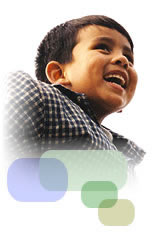|
DIABETES & RAMADAN
 As a diabetic, currently you should be eating regular meals based on
starchy foods such as rice, chapattis, bread and cereals etc. You
should also have reduced intake of high fat foods, opting for low
fat alternatives, reduced intake of sugary foods, sugar free drinks
and at least five servings of fruit and vegetables each day. As a diabetic, currently you should be eating regular meals based on
starchy foods such as rice, chapattis, bread and cereals etc. You
should also have reduced intake of high fat foods, opting for low
fat alternatives, reduced intake of sugary foods, sugar free drinks
and at least five servings of fruit and vegetables each day.
During
Ramadan dietary habits change. Only two meals are taken and there
are longer gaps in between meals. A wide variety of foods are consumed
often in large quantities and high in carbohydrates. This means that
you may experience strong swings in blood glucose levels.
In order
to help control blood sugars during Ramadan:
- Limit the amount of sweet foods and juices taken at (Iftar)
sunset
- Fill up on starchy foods such as rice, chapatti or pasta
- Include fruit & vegetables, dhal and yoghurt in your Sehri
and Iftar meals
- Try to have the meal at Iftar (sunset), Sehri (sunrise) and a snack
before bread only. This will spread out your energy intake
more evenly and result in a more balanced blood sugars level whilst fasting.
- All drinks, including fizzy drinks and cordials should be sugar
free. Use a sweetener in drinks e.g. sweetx/candrel
- Reduce fried foods such as parathas, samosas, fried kebabs, fried
chicken and Bombay mix
- Choose food that are frilled or baked, such as skinless chicken,
grilled kebabs etc
- Measure the amount of oil used in cooking (use 1-2 tablespoons for
a four person dish)Fasting & Diet Controlled Diabetes
People with diabetes controlled by diet and physical activity
may fast safely. If tablets are taken for diabetes you may
fast however
the timings
of the tablets may change. It is essential to take your
tablets during this period as they maintain your blood sugars
and keep
you well.
- If your tablets are normally taken in the morning only, take the
same dose in the evening instead.
- If you normally take your tablets twice daily, take the morning
dose at sunset and half of the evening dose at sunrise.
- If you are taking your tablets three times a day consult your GP
as your dose and timing will have to be changed for Ramadan.Fasting & Insulin
Controlled Diabetes
If you are treated with insulin you will need to be very
careful if you decide to fast
- Your insulin dose will need to be changed. Usually your normal doses
are swapped over e.g. the morning doses are taken at Sunset
and the evening doses at Sunrise
- Contact your GP, Diabetes Doctor or Diabetes Specialist Nurse.
- In order to avoid low blood sugars try to rest as much as possible
during the day.
DO NOT STOP YOUR INSULING DURING
RAMADAN
Monitoring Your Blood Sugar during Ramadan
During Ramadan your blood sugars may swing from very high to very
low levels (Hypoglycaemia or ‘hypo’). You can
recognise ‘Hypo’ if
whilst testing your blood sugar it falls below 4.0mmol/l
Signs & Symptoms
of Hypo’s include: Weakness, sweating,
trembling, tingling in the lips and fingers, slurred speech,
irritableness, hunger,
tiredness, blurred vision or sleepiness.
Treatment for hypo’s:
If you experience the listed signs or symptoms you should:
- Break your fast immediately
- Take some quickly absorbed sugar, such 3-6 glucose tablets, 1 glass
of cola/lucozade, Hypostop (a glucose gel)massaged inside
the cheek
- Follow this with some starchy food such as chapatti or bread
- Seek advice from your diabetes doctor or diabetes nurse immediately
if your blood sugar goes low.
It may be wise to rest during
the day when you are fasting and be more active at night after you have eaten.
This will
help
to balance
your
blood sugars. If you normally test your blood sugars,
you may need to do this more often during Ramadan.
|



 As a diabetic, currently you should be eating regular meals based on
starchy foods such as rice, chapattis, bread and cereals etc. You
should also have reduced intake of high fat foods, opting for low
fat alternatives, reduced intake of sugary foods, sugar free drinks
and at least five servings of fruit and vegetables each day.
As a diabetic, currently you should be eating regular meals based on
starchy foods such as rice, chapattis, bread and cereals etc. You
should also have reduced intake of high fat foods, opting for low
fat alternatives, reduced intake of sugary foods, sugar free drinks
and at least five servings of fruit and vegetables each day.